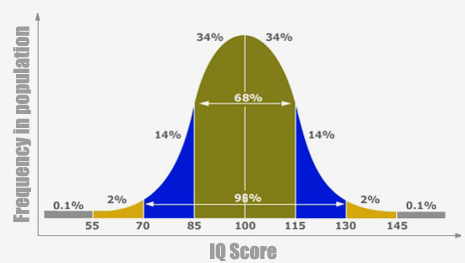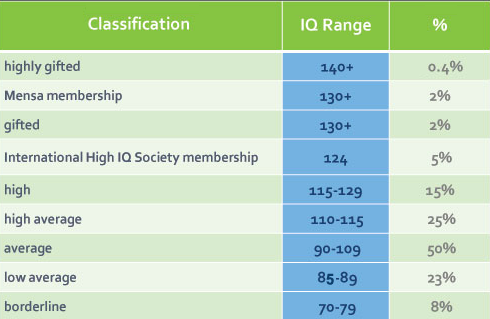What is an IQ Test? What is an Accurate IQ Test?
While people have different cognitive strengths and weaknesses (e.g. language, music, math, visual), consistent correlations between them show us there is a common component to all of these called ‘general intelligence’ or ‘G‘.
G is measured with a variety of psychometric assessments including IQ tests, job aptitude tests and university entrance exams.
IQ tests are the most reliable (e.g. consistent) and valid (e.g. accurate and meaningful) type of psychometric test that psychologists have devised. They are well-established as a good measure of a general intelligence or G.
IQ tests are widely used in many contexts – educational, professional and for leisure. Universities use IQ tests (e.g. SAT entrance exams) to select students, companies use IQ tests (job aptitude tests) to screen applicants, and high IQ societies such as Mensa use IQ test scores as membership criteria.
An overview of some valid online IQ tests can be found here
The IQ Score Bell Curve – A ‘Normal Distribution’
Standardized IQ tests are designed so that their scores have a ‘bell curve’ distribution in the general population with an average of 100. This curve has a peak in the middle where most people score and tapering ends where only a few people score. In statistics this is called a normal distribution.
.

The area under the curve between scores corresponds to the % in the population between those score. The scores on this IQ bell curve are color-coded in standard deviation units. A standard deviation is a measure of the spread of the distribution – the bigger the standard deviation, the more spread out the scores in the population. 15 points is one standard deviation for most IQ tests. Nearly 70% of the population score between 85 and 115 – i.e. plus and minus one standard deviation. A very small percentage of the population (about 0.1% or 1 in 1000) have scores less than 55 or greater than 145 – that is, more than 3 standard deviations out!
Here is a general information on evidence-based methods for how to increase IQ long term.
What is an Average IQ?
Standardized IQ tests are designed so that the average (mean) IQ score in the general population is 100. An ‘average IQ score’ or ‘normal IQ score’ can be defined as a score between 85 and 115 – that is, between plus and minus one standard deviation from the average.
What is a High IQ Score? What is Mensa Standard?
An IQ of 115 or more can be considered to be a high IQ level. Only 15% of the population have an IQ level of 115 or above. There is no magic bullet but in general it is thought that:
- An IQ of 110 or above enables you to attain a college level education if you choose it.
- If you have an IQ of 115 or above you are capable of the cognitive demands of almost any profession, and can attain the highest levels of education and training.
The entry score for An IQ of 124 is needed to become a member of the International High IQ Society. This is the first entry-point score into high IQ societies.
Around 2% of the population has an IQ greater than 130 which is ‘gifted’ intelligence. This is an IQ of 2 standard deviations from the average IQ. This is Mensa standard – the IQ score on a valid, standardized IQ test required to become a member of Mensa.
For a tutorial on how to join Mensa, click here.
What Does My IQ Score Mean? – IQ Level Scale
This table indicates how IQ levels can be classified.

IQ level is not genetically fixed
Scientific research indicates that an individual’s IQ level is not fixed genetically, and training IQ is possible. A summary review of some of this science can be found in the article How to Increase IQ? Working Memory Training, Smart Drugs and tDCS Reviewed.
If you are interested in learning more about the nature of IQ and IQ tests sign up to the free content below.

